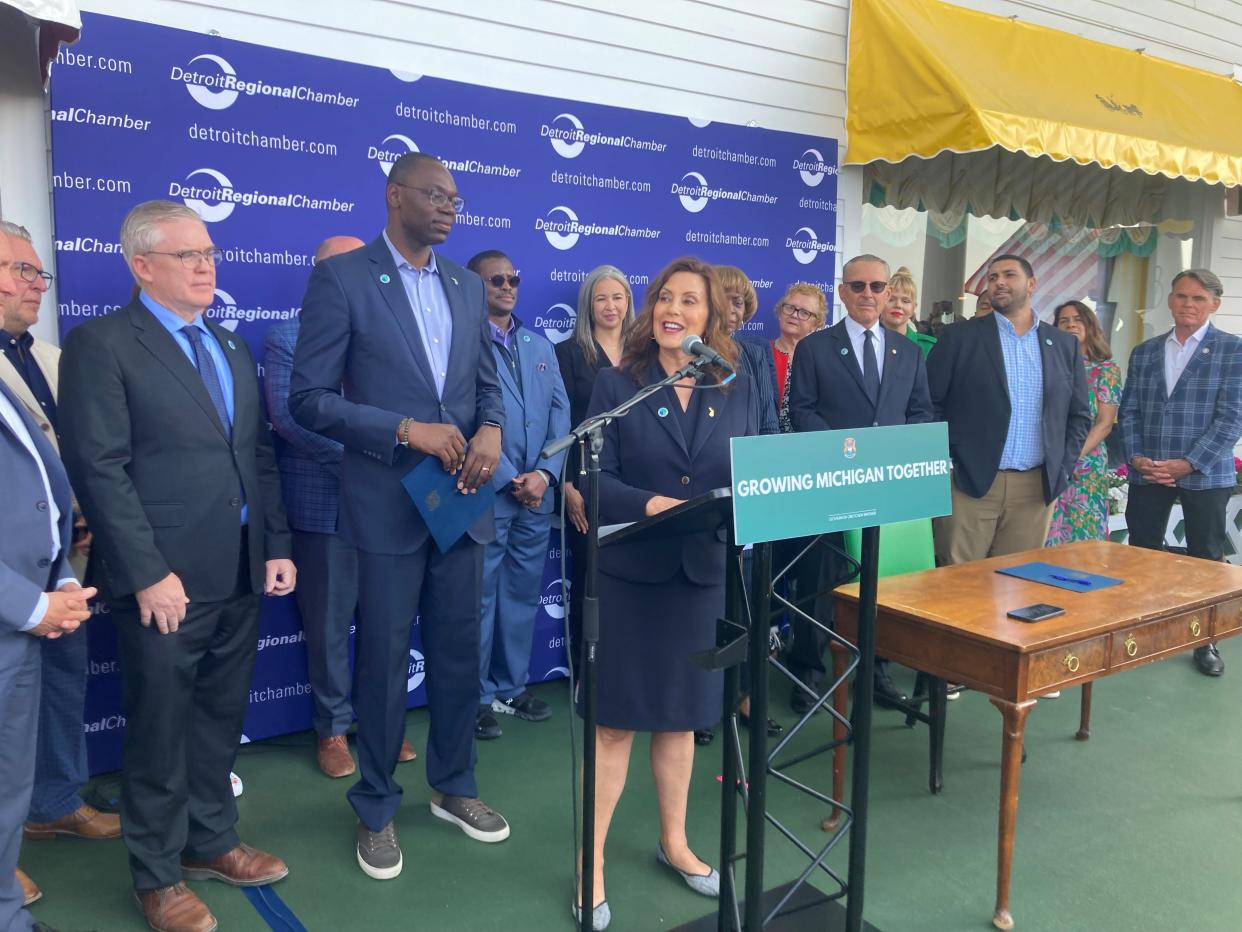Incentives, free education, public transit recommendations for Michigan population growth
A Michigan council tasked with developing solutions for the state's sluggish population growth had five months to address a problem five decades in the making.
It was enough time for the group to put forward a wide range of recommendations focused on making Michigan the "innovation hub of the Midwest", improving the state's educational outcomes and creating vibrant communities where people want to live.
But it was not enough time to provide a roadmap for funding any of its ideas.
The Growing Michigan Together Council voted to approve its final recommendations Thursday morning. All but one member of group − GOP state Rep. Pauline Wendzel, R-Watervliet − supported the group's final report. Leaders of the council say the state faces a generational crisis, one leaders have neglected for decades. They joined Gov. Gretchen Whitmer on the porch of the Grand Hotel on Mackinac Island when she announced her decision to form the council in June.

"We all know that where someone chooses to make their lives is the most important vote of confidence," Whitmer said at the time.
The council's final report outlines a series of actions Michigan should take to make the state a more attractive place for young residents to remain and prospective residents to land.
Among the slew of recommendations aimed at reversing Michigan's slow population growth, the council proposes piloting financial incentives to attract new workers to the state, offering students two years of tuition-free post-secondary education, developing regional public transit and investing in "regional innovation districts" as a way to retain more postgraduates educated in the state and support entrepreneurship.
Council faced time crunch tackling problem building for decades
Starting in the 1970s, Michigan's population started growing more slowly than the country as a whole after previously tracking the nation's growth, according to a report from the health care nonprofit Altarum and the Citizens Research Council of Michigan. Between 2000 and 2020, Michigan saw the second slowest growth in the U.S. after West Virginia, which was the only state that lost population during that period. Only Louisiana has a higher share than Michigan of residents living in the state who were born in the state, according to 2022 American Community Survey data from the Census Bureau.
Whitmer asked the council to set a population target for Michigan to achieve by 2050. Rather than setting a specific increase in population Michigan should record, the council established a different goal: "By 2050, Michigan will be a top-ten growth state," the report states.
But when it comes to laying out the path to hit that target, the council faced a time crunch.
Whitmer's Jun. 1 executive order creating the council ordered the group to submit a report within six months. Whitmer pushed back the deadline, giving the council an additional two weeks. The group began meeting five months ago. Council co-chairs John Rakolta, Jr. − the former U.S. Ambassador to the United Arab Emirates − and Shirley Stancato − a member of the Wayne State University Board of Governors − said the period between the council's formation and its obligated submission date created a tight timeline.
Asked whether Whitmer should have given the council more time to complete its work, Rakolta declined to comment. "I would prefer not to answer that question," he said. But Stancato noted Whitmer's council was short-lived.
"There's so much work, six months is not a long period of time for us just to come up with what we've done," said Stancato. "She told us in the beginning six months, right? If we didn't know until we got into this what a crisis situation we are in, she didn't know either."
Michigan needs robust rapid transit systems, council says
One recommendation Stancato highlighted was a call to develop regional transit systems. She noted for young people in particular, vibrant cities connected by public transportation are attractive places to live — something Michigan currently lacks, according to the report.
"(On) the jobs piece and also infrastructure, I think the piece that came out of that more than anything else is that rapid transit is a big, big, big, big, giant game changer for young people," Stancato said. "Young people don't want to drive. They don't want driver's licenses, and they're going to places that have rapid transit."

In the report, the council calls on the Michigan Legislature to allow for the creation of additional regional transit authorities which would evaluate how different transportation systems could work in different pockets of Michigan, noting these authorities should also work with others including the state transportation department to propose how to fund transit systems.
"The creation of rapid transit in our cities and more regionally tailored transit in our rural areas will ensure that Michiganders who choose or cannot afford to have a personal vehicle can be active, successful participants in our economy and communities," the report states.
Michigan currently has one such regional transit authority — The RTA of Southeast Michigan, which was established in 2012.
Council looks to revamp education system for 'lifelong learning'
Looking at Michigan's economic trajectory, council leaders point to failures in the state's education system as part of the reason Michigan's competitiveness has faltered. A report compiled by consultant company Guidehouse for the population council notes that Michigan is behind the national average for four-year high school graduation rates and bachelor's degree attainment. In terms of earlier education, Michigan's fourth-grade reading proficiency also is worse than the national average.
To strengthen educational outcomes in Michigan, the state needs to reimagine its current system beyond the traditional K-12 structure, the report states. It recommends providing two years of free post-secondary education, along with the creation of the "Michigan Education Guarantee," which would provide a thirteenth year of education to students who would need it.
The Michigan Education Guarantee, as proposed in the report, would also analyze the types of skills students need "to thrive in Michigan's future economy and an increasingly complex world." To establish the guarantee, the report states a group should be convened to study and analyze the best possible plans for the state's education system.
Discussion on raising taxes to pay for proposals is premature, chairs say
Whitmer told reporters last week that she wasn't contemplating ways to raise tax revenue to fund the council's proposals and instead was waiting to see what the council's final report says. Still, she conceded that revenue would likely needed to implement any recommendations.
"But like I said, I'm hoping that this commission has done the full work that the executive order contemplated in terms of staking out the blueprint, recognizing what it's going to take to get there and making recommendations about how we go about it," she said.
The council said time constraints prevented the group from undertaking a cost analysis of its proposals and a way to pay for them even though Whitmer's executive order establishing the group required members to "make recommendations on how to address any gaps between projected revenues and recommended expenditures."
So while the report outlines a litany of proposed programs, it doesn't list what they would cost or funding mechanisms that would pay for the new state expenditures that would have to take place to enact those programs.
Wendzel, the GOP state representative serving on the council, cited the group's failure to comply with this part of Whitmer's order as one of the reasons she didn't vote in favor of the recommendations.
GOP legislative leaders have characterized the council as a vehicle Whitmer would use to raise taxes, but the council's report does not recommend any tax hike.
Instead, it outlines a series of steps to consider to fund its proposals. First, determine whether additional state spending is even needed. Second, leverage opportunities for federal funding. Third, tap the private sector and philanthropy to provide financial support for the recommendations.
"Only then, could we after we finished all of those things, should we begin to start to talk about taxes. And even before we were to even breathe the word tax increase, we should be looking at the current tax structure," Rakolta said. "Is it efficient? Is it developed for the twenty-first-century Michigan economy? Have we taken electric cars into consideration?"
Without the structural changes needed to implement the council's recommendations they "will not be able to be implemented in their fullest... and they will ultimately fail," Rakolta said.
Contact Clara Hendrickson: chendrickson@freepress.com or 313-296-5743. Follow her on X, previously called Twitter, @clarajanehen.
Contact Arpan Lobo: alobo@freepress.com. Follow him on X (Twitter) @arpanlobo.
This article originally appeared on Detroit Free Press: Whitmer's Growing Michigan Together Council makes population proposals
